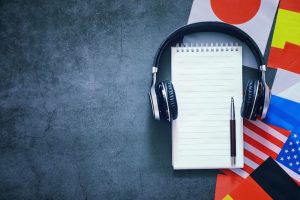If you’re a new language learner, you might be asking yourself: how long until I’m fluent?
There’s no single estimate of the time it takes to learn a foreign language fluently because everyone is different and learns at their own pace.
Different people also have different goals and motivations, and the approach they take to learning a language might not be the most efficient one.
Another difference that makes it difficult to estimate the time it takes to learn a language is the complexity of the language. Some are much harder to learn than others. Also, the relationship of the language to the learner’s native language could have an impact on how long it takes to learn a language.
For example, it may only take a few weeks for a native speaker of Italian to learn Spanish because both languages are Romance languages, meaning they stem from the same root language. Similarities exist between the languages that make learning easier because the learner already knows some of its information from their native language.
Like most learning processes, language fluency exists on a continuum. This can make it difficult for a new learner to understand how long it might take to learn a language. There are so many factors that go into how a learner progresses, such as their dedication, the relationship of the new language to their native language, and how they learn.
There are two things to consider here: how long it takes to get fluent in a language and how fast we learn as human beings. But first, we’d better define our terms. What would not count as fluency? And then, what is fluency?
What Fluency Is Not

There are many so-called language “experts” who claim to have a system in place that guarantees language fluency in just a few months. However, their definition of fluency is far different from what a native speaker of that particular language would judge as fluent.
In most cases, the fluency that the language “experts” claim to impart is really just a set of basic expressions that use simple grammar and are helpful for those individuals who are about to travel to a foreign country, most likely for a brief period of time.
These crash courses to fluency are normally gimmicks that should be more aptly called “A quick fix for people trying to cram food, history, and culture into their 10-day allocated vacation from work.”
The individuals who take these courses will be able to survive in tourist areas in the country where the language is being used for a short period of time. However, they would most likely struggle if they stayed any longer and tried to assimilate into the culture only using this “guaranteed” fluency course.
What Fluency Is

The word fluency has a few definitions. When we say that someone is fluent in the language, we mean that they know a lot of the language and can employ it well. However, in this context, fluency takes on another definition.
A fluent individual can select exactly the right word or phrase at the right time to suit the situation or context.
When we use the word fluency, we simply mean the speed at which one can produce and understand the language. This is a very simple idea of fluency, but it’s a critical language-learning goal.
For instance, think about when someone asks you for directions. Now imagine you had to give directions in the language you’re learning.
Giving directions in any language is very context-based, so you must be able to process outside information—such as your own location and the location of the place the person is seeking. Then, you must be able to formulate a response on the spot in a fairly quick fashion to demonstrate your fluency.
There comes a time in every dedicated language learner’s journey when they can give responses with little-to-no reaction time using their target language. When the target language flows naturally from the learner’s lips without much hesitation or thought, THAT is the moment when they’ve reached fluency.
Sometimes it happens when you least expect it, but it always happens after dedication and hard work. Start learning the language of your choice today. OptiLingo offers the tools and activities you need to get started on your fluency journey.







